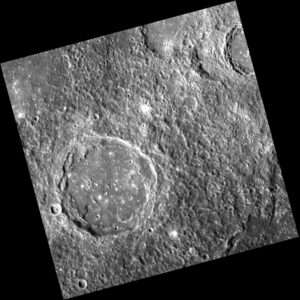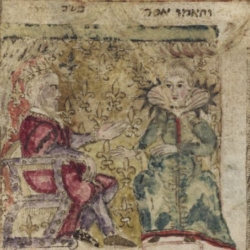A meorah — a piyyuṭ to be inserted before the ḥatima of the first blessing of the Shema’ — by the great payṭan Yehuda haLevi. This piyyuṭ was traditionally recited in eastern Ashkenazi communities on Shabbat Yitro and VaEtḥanan, the two Shabbatot where the Ten Commandments are read. Some also included it on the first day of Shavuot for the same reason.
| Source (Hebrew) | Translation (English) |
|---|---|
אִמְרוֹת הָאֵל טְהוֹרוֹת מִפְּנִינִים הֵם יְקָרוֹת בַּלְּבָבוֹת הֵם צְרֻרוֹת בַּנְּפָשׁוֹת הֵם קְשֻׁרוֹת׃ |
The Deity’s words are pure, more precious than rubies. Upon hearts they are bound, upon souls they are tied. |
יִגְעוּ כׇּל־הַדְּבָרִים מִדְּלֹק אַחַר שְׁבָחָיו מַה לְבֶן יָמִים סְפוּרִים אַחֲרֵי נֶֽצַח נְצָחָיו כַּשְּׁחָקִים מֵעֲפָרִים גָּבְהוּ מֶֽנּוּ אֳרָחָיו מַה לְּדֵעוֹת הַחֲסֵרוֹת וּתְבוּנוֹת הַקְּצָרוֹת לֶאֱחֹז דַּרְכֵי גְבוּרוֹת הַגְּבֹהֹת הַבְּצֻרוֹת׃ |
Just tiring are all words, chasing after Their praises. What is one of numbered days after Their eternal eternities? Like the heavens above dust are Their ways from us. How can the lacking knowledge and limited in understanding grasp great paths, high and mighty? |
הַס לְפָנָיו כׇּל־מְדַבֵּר בּוֹ וְאָבַד רַעֲיוֹנוֹ אַךְ בְּמִפְעָלָיו יְחַבֵּר שִׁיר וְיַאֲרִיךְ אֶת־לְשׁוֹנוֹ גַּם בְּתוֹרַת פִּיו יְגַבֵּר קוֹל וְיָרִים אֵת גְּרוֹנוֹ הַלְּשֹׁנוֹת מַאֲמִירוֹת מַעֲרִיצוֹת מַעֲטִירוֹת הַנְּשָׁמוֹת מַאֲדִירוֹת בֵּין לְהוֹדוֹת בֵּין לְהוֹרוֹת׃ |
Utter nothing before Them, for one’s thoughts will be lost. Yet by Their acts one chooses a song, extending the tongue. Also Their mouth’s Teaching raises voice and lifts the neck. Tongues exalt, admire, and crown. Souls greaten, whether thanking or teaching. |
וּבְמָה אִכַּף אֲקַדֵּם אֶזְכֶּה לִפְנֵי אֲדֹנָי בֵּית אֱלֹהִים הַאֲדַדֵּם בַּעֲגָלִים קׇרְבָּנָי מִשְּׁאוֹל יֹאמַר וְאֶפְדֵּם אֶהְיֶה כָאָב לְבָנָי כׇּל־אֲרָצוֹת הֵן לְזָרוֹת מִבְּלִי הַקְרִיב טְהֹרוֹת תִּבְנֶה רֹאשׁ הָעֲיָרוֹת תַּחְפּוֹץ שַׁי בָּעֲזָרוֹת׃ |
Doing what to merit bowing down before my Master? Should I step to God’s house with my sacrificial calves? “From Hades,” They say, “I’ll free them like a parent to My children.” All these lands are foreign, unbefitting pure sacrifices. Rebuild the Head of Cities,[1] Jerusalem, i.e. the Temple desire our gift in the courtyards! |
דָּלְלְוּ חׇכְמוֹת וְחָרְבוּ מִלְּבַב כַּלְכֹּל וְדַרְדַּע כֹּל אֲשֶׁר יָדְעוּ וְחָשְׁבוּ לֹא כְּמוֹ חָשַׁב וְיָדַע מַעֲשָׂיו עָצְמוּ וְרָבוּ מֵחֲקֹר חׇכְמָה וּמַדָּע נִפְלְאוֹתָיו לֹא־סְפוּרוֹת יוֹם לְיוֹם רָבוֹת וּפָרוֹת יִתְּנוּ תָמִיד זְמִירוֹת לוֹ וְלֹא־יָדְעוּ סְפֹרוֹת׃ |
As wisdom grows faint from even Kalkol and Darda’s minds,[2] Famous scholars, see I Kings 5:11. The word “mind” is literally “heart,” because the heart is the center of intellect in Jewish folk physiology. all they know and think is not like what They know and think. Their deeds greatly manifold, past wisdom or knowledge. Their wonders innumerable, multiplying more each day. So always grant Them hymns, not knowing the number. |
הֵא לְךָ עֵדִים בְּרוּרִים מִלְּאוּ כׇּל־הַר וְגֶֽבַע כִּי בְכׇל־צוּרוֹת יְצוּרִים יֵשׁ לְאֵל חוֹתָם וְטֶֽבַע זׇהֳרֵי כׇל־הַמְּאוֹרִים זׇהֳרֵי שֶֽׁבַע לְשֶֽׁבַע כַּאֲשֶׁר שֶֽׁבַע מְאֹרוֹת שָׂם לְשֶֽׁבַע הַמְּנוֹרוֹת שָׂם לְעֵינַֽיִם מְאִירוֹת לַחֲזוֹת אֶת־הַמְּאֹרוֹת׃ |
Here are your clear witnesses, filling each mountain and hill. For in all creatures’ forms is the Deity signed and sealed. All the luminaries’ radiance, seven for seven’s radiance. Like the seven luminaries[3] The seven planets of astrology. See Midrash Tanḥuma, Beha’alot’kha 5:1 and its interpretation of Zechariah 4:10 are the seven menorah-lights, set to enlighten the eyes to gaze upon the luminaries. |
Notes

“אִמְרוֹת הָאֵל טְהוֹרוֹת | Imrot ha-El Ṭ’horot — a meorah piyyut for days on which the Decalogue is recited, by Yehuda ben Shmuel haLevi” is shared through the Open Siddur Project with a Creative Commons Attribution-ShareAlike 4.0 International copyleft license.










Leave a Reply